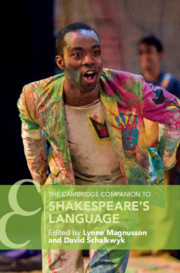
The Cambridge Companion to Shakespeare's Language
Series: Cambridge Companions to Literature;
- Publisher's listprice GBP 24.00
-
11 844 Ft (11 280 Ft + 5% VAT)
The price is estimated because at the time of ordering we do not know what conversion rates will apply to HUF / product currency when the book arrives. In case HUF is weaker, the price increases slightly, in case HUF is stronger, the price goes lower slightly.
- Discount 10% (cc. 1 184 Ft off)
- Discounted price 10 660 Ft (10 152 Ft + 5% VAT)
Subcribe now and take benefit of a favourable price.
Subscribe
11 844 Ft

Availability
Estimated delivery time: In stock at the publisher, but not at Prospero's office. Delivery time approx. 3-5 weeks.
Not in stock at Prospero.
Why don't you give exact delivery time?
Delivery time is estimated on our previous experiences. We give estimations only, because we order from outside Hungary, and the delivery time mainly depends on how quickly the publisher supplies the book. Faster or slower deliveries both happen, but we do our best to supply as quickly as possible.
Product details:
- Publisher Cambridge University Press
- Date of Publication 8 August 2019
- ISBN 9781107583184
- Binding Paperback
- No. of pages298 pages
- Size 227x153x15 mm
- Weight 500 g
- Language English
- Illustrations 2 b/w illus. 2 tables 0
Categories
Short description:
Illuminates the pleasures and challenges of Shakespeare's complex language for today's students, teachers, actors and theatre-goers.
MoreLong description:
The power of Shakespeare's complex language - his linguistic playfulness, poetic diction and dramatic dialogue - inspires and challenges students, teachers, actors and theatre-goers across the globe. It has iconic status and enormous resonance, even as language change and the distance of time render it more opaque and difficult. The Cambridge Companion to Shakespeare's Language provides important contexts for understanding Shakespeare's experiments with language and offers accessible approaches to engaging with it directly and pleasurably. Incorporating both practical analysis and exemplary readings of Shakespearean passages, it covers elements of style, metre, speech action and dialogue; examines the shaping contexts of rhetorical education and social language; test-drives newly available digital methodologies and technologies; and considers Shakespeare's language in relation to performance, translation and popular culture. The Companion explains the present state of understanding while identifying opportunities for fresh discovery, leaving students equipped to ask productive questions and try out innovative methods.
'Even though the volume is primarily intended for students of Shakespeare, it is no less suited for teachers, theatre professionals, and researchers who seek innovative ways to mine the richness of Shakespeare's language ... What admirably binds these essays together is their careful scrutiny of the vital work that language does - what Shakespeare does with language and what the language of Shakespeare's time does to him, and what we do with Shakespeare's language and what this language does to us, in turn.' Jelena Marelj, Renaissance et R&&&233;forme
Table of Contents:
Part I. Basic Elements: 1. Shakespeare and the problem of style Jeff Dolven; 2. Shakespeare's creativity with words Alysia Kolentsis; 3. The performative power of Shakespeare's language David Schalkwyk; 4. Verse and metre Oliver Morgan; 5. The dynamics of Shakespearean dialogue Lynne Magnusson; 6. Figures of speech at work Ruth Morse; Part II. Shaping Contexts: 7. Approaching Shakespeare through rhetoric Peter Mack; 8. Shakespeare and social languages James Siemon; Part III. New Technologies: 9. Digital approaches to Shakespeare's language Jonathan Hope; 10. Authorship, computers, and comparative style Hugh Craig; 11. Reading in time: cognitive dynamics and the literary experience of Shakespeare Amy Cook and Seth Frey; Part IV. Contemporary Sites for Language Change: 12. Writing for actors: language that cues performance Carol Chillington Rutter; 13. Language and translation Dirk Delabastita; 14. Popular culture and Shakespeare's language Douglas M. Lanier.
More



